God’s feasts changed my life forever
I was 7 years old when my life changed forever. This was the year my Mom informed my sister and I that we would be celebrating Passover instead of Easter. I remember not knowing what she was talking about at that age but feeling rather apprehensive about the thought of not getting an Easter basket that year full of chocolate bunnies. When it came time for the first night of Passover, my family gathered around the table. In the center were a plate of unleavened bread and a bowl of bitter herbs. That was it.
Mom then began to share with us what she had previously shared with Dad regarding how the Lord had placed celebrating Passover on her heart this year. As she recounted, she had been pouring through Leviticus 23 when she asked the Lord, “Lord, can we keep these ‘Jewish’ feasts too?”, only to hear Him respond, “These are MY Appointed Feasts” (Lev 23:2). We realized that even though we grew up being taught that God’s feasts days are “Jewish,” God never called them that. Furthermore, we also realized that God called His people to keep the commandments regarding the feasts “forever” (Exodus 12:14), and that they would never pass away (Matt 5:18).
This day shall be for you a memorial day, and you shall keep it as a feast to the LORD; throughout your generations, as a statute forever, you shall keep it as a feast.
Exodus 12:14
So we gathered around the table to do a Passover seder and I can only imagine that our Heavenly Father smiled down on us as we stumbled our way through our humble seder, having only unleavened bread, bitter herbs and a Bible. With simple childlike faith and obedience, my parents guided the family before the Father, recognizing that we didn’t know what we were doing, but that we needed to keep this Appointed Time.
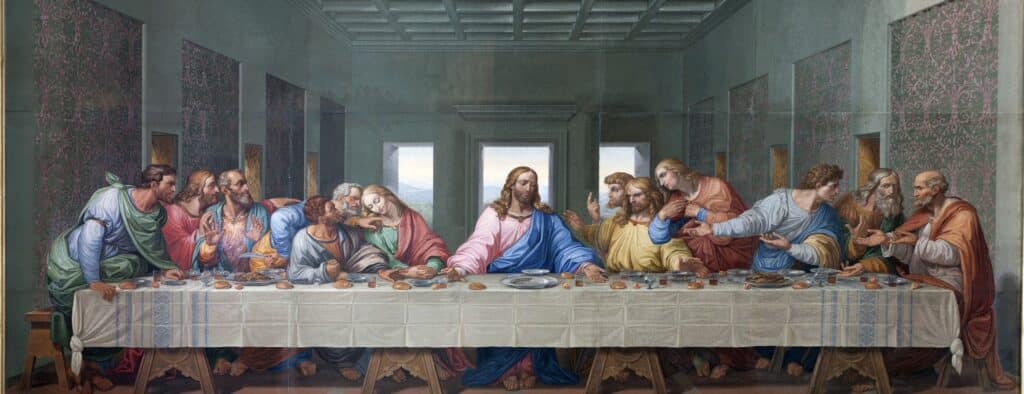
As children, we weren’t so sure about this Passover thing at first. But with each passing year, our Passover seders became better as we learned more, and we as children began to enjoy and look forward to Passover. It was then that the Lord started opening our eyes even more to the Hebraic foundation of our faith.
I began my deeper study into the matter in 2007, and information regarding this topic was not as widely available as it is now. I recall pouring through countless websites, articles, books and anything I could get my hands on to gather information as I studied this subject out for myself.
As I realized how Yeshua was revealed in the first feast, Passover, my quest began to discover how each of the remaining Festivals revealed Yeshua:
Spring Feasts:
- Passover / Feast of Unleavened Bread
- First Fruits
- Shavuot (Pentecost)
Fall Feasts:
- Yom Teruah (Feast of Trumpets)
- Yom Kippur (Day of Atonement)
- Sukkot (Feast of Tabernacles)
As I delved into the Biblical Feasts, the Lord revealed that veiled within each of these Appointed Times was the entire Gospel story, like a harbinger waiting to be unlocked. Each told a different and vital part of our Messiah’s first coming…and His return. We will now look into some of the amazing ways Yeshua fulfilled the spring feasts.
1. Passover (Pesach)
From Slavery Into Freedom
“These are the appointed feasts of the LORD’s, the holy convocations, which you shall proclaim at the time appointed for them. In the first month, on the fourteenth day of the month at twilight, is the LORD’s Passover.”
(Leviticus 23:4-5)
The first of the Spring Feasts given in Leviticus 23 is Passover. Passover and the following seven days of the Feast of Unleavened Bread commemorates how God redeemed Israel out from under slavery and bondage in the land of Egypt, as told in the story of the Exodus. It tells the dramatic story of a people brought from slavery into freedom, darkness into light, and death into life.
Likewise, through Yeshua, we see the same story of Passover. Yeshua (Jesus) who came as Israel’s Messiah and Deliverer to free all who accept His free gift of salvation from slavery to sin and death, so that through His sacrifice as our Passover Lamb they may walk in newness of life, and life abundantly in Him. It is the same journey from slavery to freedom, darkness to light, death to life – yet with even greater fulfillment!
In the first Passover in Egypt, God instructed Israel to sacrifice a spotless lamb and to place its blood on the doorframes of their homes so that they may live. Nearly 1,500 years later, another spotless Lamb was sacrificed so that whoever believes in Him may have eternal life. This Lamb is Yeshua, who came as the Lamb of God even as John the Baptist proclaimed in John 1:29 when he saw Yeshua approach to be immersed,
“…Behold the Lamb of God, who takes away the sin of the world”
(John 1:29)
The celebration of Passover and the Passover Seder contains certain key elements. These elements point back to the first deliverance from “physical” Egypt, but as believers in Yeshua, we can see how each element also points to our deliverance from “spiritual” Egypt. Some of these elements are visible in the final Passover seder Yeshua held with His disciples.
Unleavened Bread
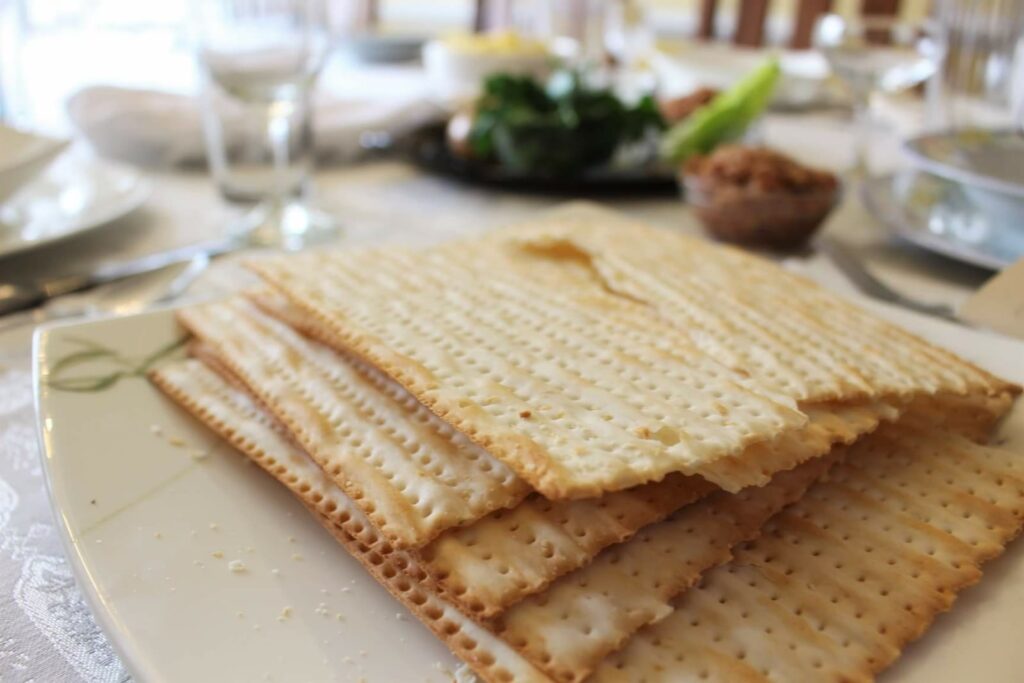
“Matzo” / the unleavened bread God commanded Israel to make in haste when leaving Egypt.
One of the most important of these elements present is the “matzo,” the unleavened bread God commanded Israel to make in haste when leaving Egypt. But like the rest of the Passover story and Seder, in this physical element is also a spiritual element. When Paul writes to the fellowship of Corinth, he instructs them to purge not only the physical leaven but the spiritual leaven, being sin, in preparation for Passover and the Feast of Unleavened Bread,
“Cleanse out the old leaven that you may be a new lump, as you really are unleavened. For Messiah, our Passover lamb, has been sacrificed. Let us therefore celebrate the festival, not with the old leaven, the leaven of malice and evil, but with the unleavened bread of sincerity and truth.”
(1 Corinthians 5:7-8)
Yeshua is revealed in the unleavened bread of the Seder, as He was also unleavened and without sin (1 Peter 2:22). The matzo bears stripes and bruises on its surface, reminding us of Isaiah 53:5 which states that Messiah would be bruised and pierced for our iniquities. In the Seder, there are three matzot that are stacked, and during the seder, the middle of the three is taken out and broken. It is this matzo that Yeshua broke in Mark 14:22,
“…He took bread, and after blessing it broke it and gave it to them, and said, “Take; this is my body”.
Mark 14:22
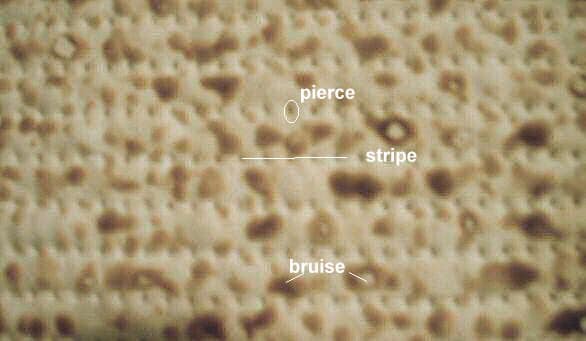
The unleavened bread bears stripes and bruises on its surface
The other half of this broken matzo is then wrapped in a linen cloth and hidden away to be found later by a child. It is called the “Afikomen”, which comes from the Greek “Afikomenos”, which means “He who is coming” or “He who has come”. Like the afikomen, Messiah was likewise wrapped in a linen cloth and buried, hidden away from view, in a tomb,
“And Joseph took the body and wrapped it in a clean linen shroud and laid it in his own new tomb…”
(Matthew 27:59-60)
Near the end of the Passover Seder, Yeshua lifted the third cup of wine that is drunk during the seder (Mark 14:23). This cup is known as the Cup of Redemption, and represents His blood, which would soon be shed for the remission of their sins. The bread and wine would become what is commonly known today as “communion”, but was an important part of the Passover celebration Yeshua had with His disciples to remember His body that was broken, and blood that was shed.
Even as Yeshua celebrated Passover with His disciples, He instructed them that as often as they celebrate Passover, to do it in remembrance of Him (1 Corinthians 11:24-25). Passover is the first Spring Festival that reveals the first pivotal piece in the Gospel story – the Redemption of Israel.
2. First Fruits
The Resurrection
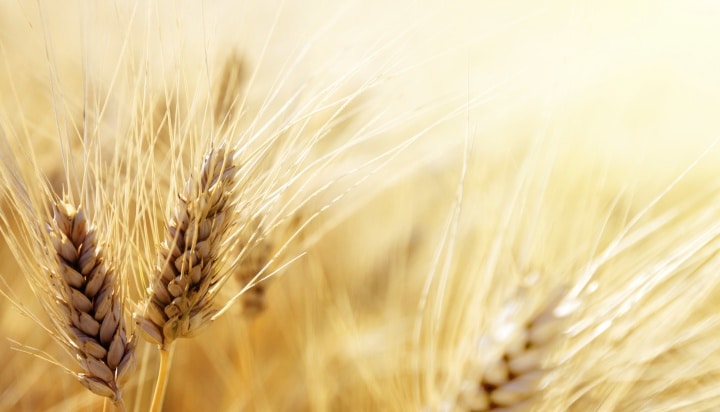
Leviticus 23:10 introduces the Festival of First Fruits – often synonymous with ‘Passover’ as it is part of the same festival. First Fruits was commemorated by a priest lifting up and waving a sheaf of the first fruits of Israel’s barley harvest as an offering before the Lord in praise and thanks (Leviticus 23:9-14). First Fruits takes place on the first day after the weekly Sabbath in the midst of Passover.
Just as Passover was a foreshadow of Messiah’s sacrifice as our Passover lamb, First Fruits points towards Yeshua’s resurrection. Yeshua was also lifted up when He rose from the dead on the day after the Sabbath, on the very day of the Feast of First Fruits. As the first fruit of the resurrection, Yeshua broke the very chains of death and provided the gift of eternal life to all who believe,
“But in fact Messiah has been raised from the dead, the firstfruits of those who have fallen asleep.”
(1 Cor. 15:20-23)
Yeshua’s death brought redemption and His resurrection brought new life!
The Festival of First Fruits is also a promise of more to come. As Yeshua came to give us life, and life abundantly, He also calls us to live our lives by following His example and walking as He walked through the empowerment of the Holy Spirit. Following Yeshua’s resurrection on First Fruits, He preached the Kingdom of God for an additional 40 days during the time known as the “Counting of the Omer”, and then before He ascended, He gave the Disciples one last instruction on what would happen next.
“You will receive power when the Holy Spirit has come upon you, and you will be my witnesses in Jerusalem and in all Judea and Samaria, and to the end of the earth.”
(Acts 1:8)
3. Pentecost (Shavuot)
The Hope of a Holy Spirit
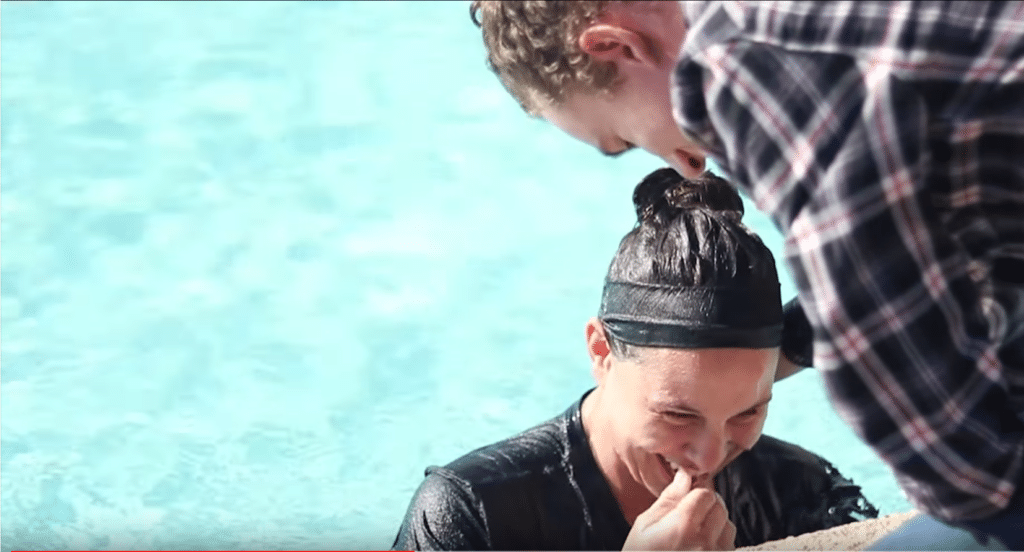
The Spring Feasts conclude and culminate in the feast most Christians are familiar with: Shavuot (Pentecost), the giving of the Holy Spirit, the inauguration of the Great Harvest and the spread of God’s Kingdom on earth as it is in heaven. In fact, this is the Appointed Time that the previous Spring feasts point towards! Each festival is connected. Passover shows the redemption of Israel, Unleavened Bread commemorates the cleansing of leaven, First Fruits celebrates new life, and now, Shavuot is the final Spring festival.
In the Torah, Shavuot (also called the Feast of Weeks) is a Harvest festival. It is also traditionally the celebration of the giving of the Torah and making of the covenant on Mount Sinai with the people of Israel, from YHVH (God) to His Bride. It’s a betrothal ceremony.
In Acts 2, Shavuot is a harvest festival, but on an even greater scale. On this day, the Holy Spirit fell on those 120 who were gathered in an upper room in Jerusalem and they were anointed with the Ruach HaKodesh (Holy Spirit). The very next moment, they stepped out in the power of the Spirit and began speaking in foreign tongues proclaiming the Message of Salvation through Yeshua to all those who were also gathered there in Jerusalem to keep this feast of Shavuot. On that day, 3,000 came to faith in Yeshua and were baptized, inaugurating the beginning of the greater harvest of the nations that Shavuot had pointed towards from the very beginning!
Called to be a light
This was the beginning of the greater Harvest that we are called to take part in. We are living during the time of the Harvest, and the fields are ripe for the harvest (John 4:35). The Holy Spirit was given as a seal and the pledge of our inheritance (Eph 1:13-14). When we accept Yeshua as our Messiah, when we say “I do” to become His Set-Apart Bride, it is this seal, this Holy Spirit, that anoints us and empowers us to live and walk as His Bride. And as His Bride, we are called to be a Light to the Nations and to spread His Kingdom throughout the Earth.
This is the message of the Kingdom! This is what Yeshua came to preach and walk out when He began His ministry in Luke 4 by quoting Isaiah 61, proclaiming that the Spirit of the Lord was upon Him and had anointed Him to proclaim good news to the poor, freedom to the captive, recovery of sight to the blind, and to proclaim the year of the Lord’s favor. And now we are called to walk as Yeshua walked.
We are called to worship Him in Spirit and in Truth, which is walking in the fullness of the truth of His Word and Torah, and walking in the power of the Ruach HaKodesh (Spirit), even as the disciples did in Jerusalem in Acts 2. Each of the Appointed Times given by the Father is a yearly reminder for us to do this very thing. This is the message of the Kingdom that we are called to walk in, will you answer this call?
“And I heard the voice of the Lord saying, “Whom shall I send, and who will go for us?” Then I said, “Here I am! Send me.”
(Isaiah 6:8)
There are more feasts!
As you’ve now learned some of the ways in which Yeshua’s story was fulfilled in the Spring Feasts, we have only scratched the surface of the depth to be discovered. While God has fulfilled the spring feasts in Yeshua, He has left us with fall feasts which have not been fulfilled yet, but will reach their fulfillment at the end of the age when (1) Yeshua returns, (2) the judgment occurs and (3) our tears are wiped away at the marriage supper of the lamb. Each event has a fall feast day associated with it that God has instructed us to observe in preparation of the future and our future wedding date with our King, so we may be a virgin with lamps filled with oil.
May your lamps be filled this festive season!
Continue: Watch Rise on Fire Video teachings on the festivals of God

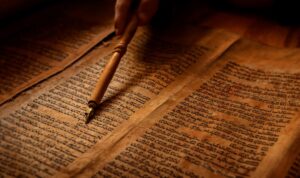
3 thoughts on “Jesus in the Biblical Festivals: The Spring Feasts”
Thank you for this. I am trying to convince my husband and children to not celebrate the traditional man-made (and deeply pagan) holidays, but to instead look into the feast days of God…with little success (Christmas is a hard sell! But I believe Easter will be traded for Passover). My decision to “go it alone” and be the only one in my family to choose to not celebrate Christmas has caused some tension. Thank you for making me feel less alone.
Hi Tamara! Someone with Jewish roots but who believes in Yeshua, once wisely told me something I will never forget: you don’t HAVE to stop celebrating the Easter or Christmas. Even though they have pagan roots, they do make the world stop and look (at least some) to the One who is the Light of the World. You can use those dates to point them to Yeshua as well. There’s a lot of richness in details in studying the Shadows of the Messiah in the Old Testament and in the Feasts that so clearly point to him, and that’s great and beautiful! However, if celebrating these feasts (or stopping the other ones) will cause a divide in your family, ask God to guide you on the how. They are simply (but beautiful and powerful) shadows of our savior. These details are to open our eyes to the Messiah, they were signs and hints God left his people regarding the first and second comings of Yeshua. They’re not meant for division! Like Paul told the gentile believers when there was a bit of s dispute about these things in his time, Christ is the reality and the most important! Lead your family to this richness in love; if it’s causing a divide, ask God to help you, but your role is to lovingly guide them, not cause tension.
”Therefore, do not let anyone pass judgment on you in matters of food or drink, or in respect to a festival or new moon or Shabbat. These are a foreshadowing of things to come, but the reality is Messiah.“
Colossians 2:16-17 TLV
Thank you for posting info this!